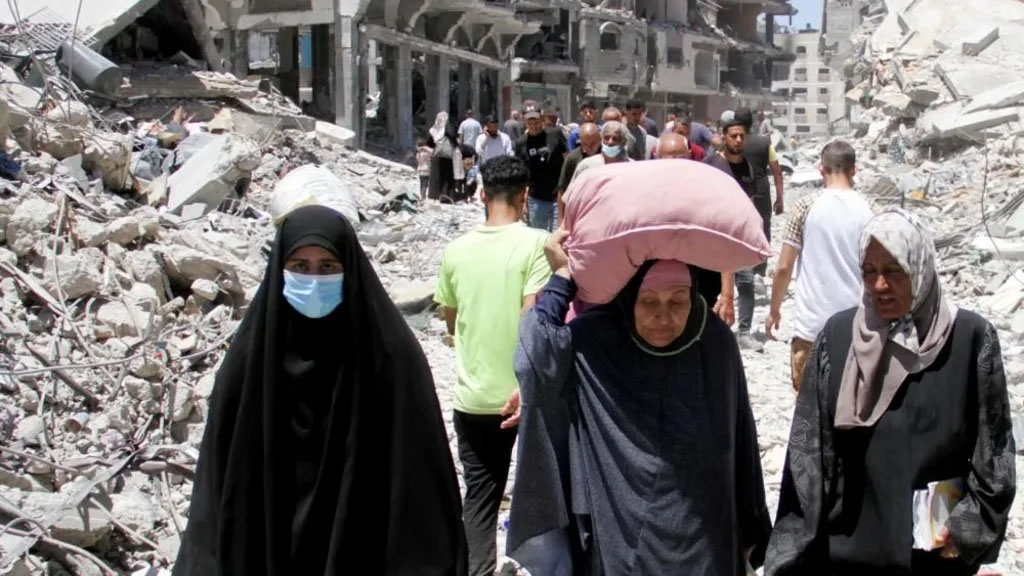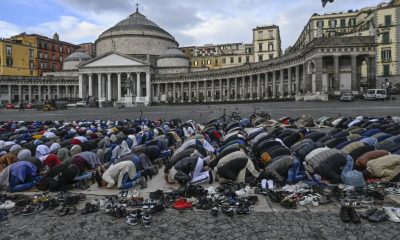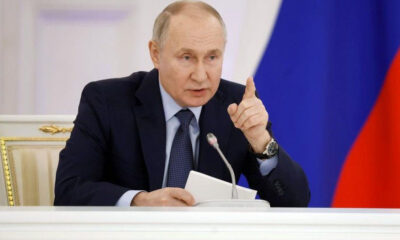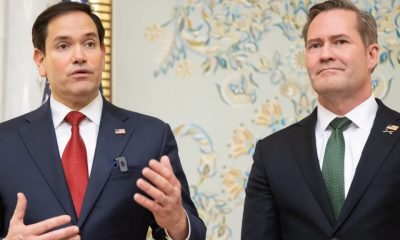International
Gaza ceasefire plan turns deadly game of survival – BBC

Gaza ceasefire plan turns deadly game of survival – BBC
For the leaders of both Hamas and Israel, ending the war in Gaza has become a deadly game of survival.
The terms on which the war finally ends could largely determine their political future and their grip on power. For Hamas leader Yahya Sinwar, even his physical survival.
It’s partly why previous negotiations have failed. It’s also why the question of how to permanently end the fighting has been put off to the last stages of the plan outlined by US President Joe Biden on Friday.
That transition between talks on a limited hostage-for-prisoner deal to discussions about a permanent ceasefire would, Mr Biden acknowledged, be “difficult”.
But it’s also where the success or failure of this latest deal is likely to hinge.
The US says it has submitted a draft resolution to the UN Security Council supporting the ceasefire plan outlined by President Biden. The three-phase plan involves an end to the conflict, the release of the hostages and reconstruction of the Palestinian territory.
READ ALSO:
- EFCC offers 5% reward to whistleblower in naira abuse case
- Obasanjo says crude oil Nigeria’s source of misfortune
- Labour may call off strike today as FG promises minimum wage above N60,000
Israel’s Prime Minister, Benjamin Netanyahu, has strong domestic reasons for wanting to take this deal step by step.
Phase one, as outlined by Mr Biden, would see the release of dozens of hostages, both living and dead. That would be widely welcomed in a country where the failure to free all those held by Hamas is, for many, a glaring moral stain on Mr Netanyahu’s management of the war.
But Hamas is unlikely to give up its most politically sensitive hostages – women, wounded, elderly – without some kind of guarantee that Israel won’t simply restart the war once they’re home.
Leaks, quoted by Israeli media on Monday morning, suggested that Benjamin Netanyahu has told parliamentary colleagues that Israel would be able to keep its options open.
That option, to resume fighting – until Hamas is “eliminated” – is, some believe, the least Mr Netanyahu’s far-right coalition partners will demand.
Without their support, he faces the prospect of early elections and the continuation of a corruption trial.
Mr Netanyahu needs to keep his long-term options open, to stand a chance of winning their support for any initial hostage deal. Hamas leaders, on the other hand, are likely to want permanent ceasefire guarantees upfront.
Previous deals have collapsed into this chasm. Bridging it now will depend on how much room for manoeuvre Mr Netanyahu has with his hard-right government allies to find alternatives to the “elimination” of Hamas – and how far Hamas leaders are prepared to consider them.
Mr Netanyahu talked over the weekend about the destruction of Hamas’s “military and governing capabilities” and ensuring that the group no longer posed a threat to Israel.
Few dispute that Hamas has suffered major losses to its military infrastructure – and even, some say, to its public support within Gaza and its control of the streets.
READ ALSO:
- MURIC condemns labour strike, says it’s a plan to frustrate Muslims
- Strike: Let’s avert another round of hardship, Sultan tells labour
- Labour leaders fighting proxy war for Peter Obi – Reno Omokri
But there’s no sign that Israel has killed or captured its top leaders Yahya Sinwar and Mohammed Deif, and leaving them free in Gaza to celebrate the withdrawal of Israeli forces would spell political disaster for Israel’s embattled prime minister.
On Monday a US State Department spokesman said that although Hamas’s capabilities had “steadily degraded” in recent months, it remained a threat and the US did not believe the group could be eliminated militarily.
Meanwhile the White House said Mr Biden had “confirmed Israel’s readiness to move forward with the terms that have now been offered to Hamas” and said the Palestinian group was now the only obstacle to a deal.
Separately, military spokesman Rear Admiral Daniel Hagari said the Israeli military would be able to ensure Israel’s security in the event of any truce agreed by the government.
However Yanir Cozin, diplomatic correspondent with Israel’s military radio station, GLZ, believes that Mr Netanyahu won’t end the war until he can frame it as a success.
“A deal that leaves Hamas is a big failure,” he said. “Eight months on, when you haven’t achieved any of the war goals – not finishing Hamas, bringing all the hostages back, or securing the borders – then he doesn’t want to end the war. But he also understands that he cannot leave it until the next Israeli election in 2026.”
“If he can say, ‘We exiled Yahya Sinwar and Mohammed Deif, they’re not living in Gaza’ – and if the people living close to Gaza and the northern border can go back – I think he can keep his government together. But it’s a lot of ‘ifs’.”
Hamas is very unlikely to agree to the exile or surrender of its top figures. But there are clear splits emerging between Hamas leaders inside and outside Gaza.
Former Israeli prime minister Ehud Barak, who has also served as defence minister, told Israeli radio on Monday that President Biden had announced the deal “after seeing that Netanyahu only moves ahead when he’s certain that Sinwar will refuse”.
“How do you think Sinwar will react when he tends to agree and then he’s told: but be quick, because we still have to kill you after you return all the hostages,” he said.
In the meantime, tens of thousands of Israelis displaced after the Hamas attacks on 7 October are watching their prime minister’s next move.
Among them is Yarin Sultan, a 31-year-old mother of three who ran from her home in Sderot on Gaza’s border the morning after the Hamas attacks. She says she won’t go home until Yahya Sinwar and Mohammed Deif are no longer free.
“This ceasefire will kill us,” she told the BBC. “We will free the hostages, but a few years from now you will be the next hostages, you will be the next people who get murdered, the women that are raped – all this will happen again.”
Gaza ceasefire plan turns deadly game of survival – BBC
BBC
International
Democrats drag Trump to court over election overhaul order

Democrats drag Trump to court over election overhaul order
The Democratic Party has sued the Trump administration over an attempt to impose sweeping changes on the election systems, including requiring citizenship proof to register to vote and limiting mail-in ballot counting.
In a lawsuit filed Monday, the Democratic Party asked a federal court to block the executive order, which prevents states from counting mail-in ballots that arrive after election day. The president’s directive also requires proof of citizenship to be presented — through documents such as a passport — when registering to vote.
“The President does not get to dictate the rules of our elections,” said the lawsuit filed in Washington by the Democratic National Committee, Senate Minority Leader Chuck Schumer, House Minority Leader Hakeem Jeffries and others.
“The Executive Order seeks to impose radical changes on how Americans register to vote, cast a ballot, and participate in our democracy—all of which threaten to disenfranchise lawful voters and none of which is legal,” it added.
After signing the March 25 order, called “Preserving and Protecting the Integrity of American Elections”, US President Donald Trump described it as “the farthest-reaching executive action taken” to secure US elections.
READ ALSO:
- If anything happens to me, hold Akpabio, others responsible – Natasha
- Breaking: ‘Cancel your homecoming’ — Police tell Senator Natasha
- Lightning strike kills herder, 12 cows in Kaduna
Trump, who does not acknowledge his defeat in the 2020 presidential election, has long questioned the integrity of the US electoral system. He has repeatedly and baselessly amplified conspiracy theories about massive election fraud in the United States, particularly involving absentee voting.
Legal scholars swiftly denounced Trump’s election order as an abuse of presidential power that could prevent millions of eligible voters from casting ballots.
Advocacy groups led by the Campaign Legal Center and State Democracy Defenders Fund filed a separate lawsuit on Monday against the same executive order.
“The president’s executive order is an unlawful action that threatens to uproot our tried-and-tested election systems and silence potentially millions of Americans,” Danielle Lang of the Campaign Legal Center said in a statement.
“It is simply not within the president’s authority to set election rules by executive decree, especially when they would restrict access to voting in this way.”
Democrats drag Trump to court over election overhaul order
AFP
International
Iran warns US against attack, threatens with nuclear weapon

Iran warns US against attack, threatens with nuclear weapon
Iran would have no alternative but to acquire a nuclear weapon if attacked by the United States or its allies, an adviser to the country’s supreme leader warned on Monday, following a threat by Donald Trump.
The comments came hours after the supreme leader himself, Ayatollah Ali Khamenei, had promised to hit back if the US president made good on his threat to bomb the Islamic republic if it did not agree to a deal to curb its nuclear programme.
“We are not moving towards (nuclear) weapons, but if you do something wrong in the Iranian nuclear issue, you will force Iran to move towards that because it has to defend itself,” Khamenei’s adviser Ali Larijani said in an interview with state TV.
“Iran does not want to do this, but… (it) will have no choice,” he added.
“If at some point you (the US) move towards bombing by yourself or through Israel, you will force Iran to make a different decision.”
In an interview on Saturday, Trump had said “there will be bombing” if Iran did not agree to a new nuclear deal, according to NBC News, which said he also threatened to punish Tehran with what he called “secondary tariffs”.
Trump’s language represented a sharpening of his rhetoric, though it was not clear whether he was threatening bombing by US planes alone or perhaps in an operation coordinated with another country, possibly Iran’s nemesis Israel.
“They threaten to do mischief,” Khamenei said of the remarks during a speech on Eid al-Fitr, the holiday marking the end of the Muslim fasting month of Ramadan.
READ ALSO:
- Lagos Govt says speed limit rules have come to stay
- Aide to Israel’s Netanyahu arrested in PM corruption probe
- Kano Gov Yusuf, Sanusi linked to Eid killings
“If it is carried out, they will definitely receive a strong counterattack.”
Iranian foreign ministry spokesman Esmaeil Baqaei, in a post on X, said the threat was “a shocking affront to the very essence of international peace and security”.
Baqaei warned of unspecified “consequences” should the United States choose a path of “violence”.
Western countries including the United States have long accused Iran of pursuing a nuclear weapon, which Tehran has denied, insisting its enrichment activities were solely for peaceful purposes.
The 2015 nuclear deal between Tehran and world powers required Iran to limit its nuclear ambitions in exchange for sanctions relief.
– ‘Indirect’ channel –
On March 7, Trump said he had written to Khamenei to call for nuclear negotiations and warn of possible military action if Tehran refused.
READ ALSO:
- Amosun, Adeola engage in verbal attack over project diversion allegation
- 2027 election: Shehu Sani declares bid for Kaduna central senatorial seat
- How they murdered my Kano-bound passengers in Edo
The letter was delivered to Tehran on March 12 by UAE presidential adviser Anwar Gargash, Iranian news agency Fars reported at the time.
On Thursday, Iranian Foreign Minister Abbas Araghchi said the country had delivered a response via intermediary Oman, without detailing its content.
Araghchi said Iran would not engage in direct talks “under maximum pressure and the threat of military action”.
In his remarks, however, the minister left open the door for “indirect negotiations”.
According to NBC, Trump also said US and Iranian officials were “talking,” but he did not give details.
President Masoud Pezeshkian on Sunday said Khamenei, who as supreme leader has the final say in major state policies, had permitted indirect talks.
Oman has served as an intermediary in the past, in the absence of US-Iranian diplomatic relations severed after the 1979 Islamic revolution.
On Monday, Araghchi said the United States had received Iran’s letter.
“We have been informed by our friends in Oman that the letter has reached its destination and has been read.”
Beyond its nuclear programme, the West also accuses Iran of using proxy forces to expand its influence in the region, a charge Tehran rejects.
“There is only one proxy force in this region, and that is the corrupt usurper Zionist regime,” Khamenei said, calling for Israel to be “eradicated”.
Iran warns US against attack, threatens with nuclear weapon
International
‘Bitcoin could replace U.S. Dollar as global currency’

‘Bitcoin could replace U.S. Dollar as global currency’
BlackRock Chairman and CEO Larry Fink acknowledged in his 2025 annual letter that Bitcoin could challenge the U.S. dollar’s status as the global reserve currency.
“If the U.S. doesn’t get its debt under control, if deficits keep ballooning, America risks losing that position to digital assets like Bitcoin,” Fink wrote in BlackRock’s March 2025 letter.
The statement marks a significant shift from the head of the world’s largest asset manager, recognizing digital assets as potential alternatives to the dollar.
Throughout the letter, Fink mentioned Bitcoin seven times and the dollar eight times, signaling the growing relevance of digital currencies in financial discourse.
READ ALSO:
- Aide to Israel’s Netanyahu arrested in PM corruption probe
- Kano Gov Yusuf, Sanusi linked to Eid killings
- ‘I was offered N5bn bribe to impeach Fubara’
BlackRock’s letter frames Bitcoin as both an innovation and a risk, warning that if investors view it as a more stable long-term store of value than the dollar, it could undermine U.S. financial primacy.
Fink stressed that “two things can be true at the same time,” referring to both innovation and risk in digital asset development.
Beyond Bitcoin, Fink positioned tokenization as a transformative force for capital markets, likening it to the shift from postal mail to email.
He argued that tokenized assets could bypass financial intermediaries and democratize access to investments through fractional ownership and improved voting systems.
BlackRock also highlighted India’s digital identity system as a model for secure transactions, with over 90% of Indians verifying smartphone transactions—a benchmark for future tokenized economies.
‘Bitcoin could replace U.S. Dollar as global currency’
-

 metro18 hours ago
metro18 hours agoBREAKING: Senator Natasha defies restrictions, arrives homecoming rally by helicopter [VIDEO]
-

 metro2 days ago
metro2 days agoHow they murdered my Kano-bound passengers in Edo
-

 International2 days ago
International2 days agoIn pictures: Eid celebrations around the world
-

 metro1 day ago
metro1 day agoUromi: Edo residents flee towns over likely reprisal attack, arrest
-

 metro1 day ago
metro1 day agoBreaking: ‘Cancel your homecoming’ — Police tell Senator Natasha
-

 metro2 days ago
metro2 days ago‘I was offered N5bn bribe to impeach Fubara’
-

 metro2 days ago
metro2 days agoKano Gov Yusuf, Sanusi linked to Eid killings
-

 Sports2 days ago
Sports2 days agoNigerian boxer collapses, dies in ring during fight in Ghana













